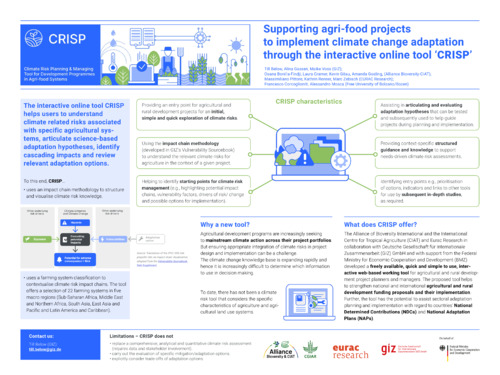Supporting agri-food projects to implement climate change adaptation through the interactive online tool ‘CRISP’
Introduction
International agri-food system programmes are increasingly seeking to mainstream climate action across their portfolios. A range of methods and tools exists, but there is no “ready-to-use” tool that allows a cost- and time-effective climate risk assessment for specific agri-food systems and the development of adaptation hypotheses. The Deutsche Gesellschaft für Internationale Zusammenarbeit (GIZ), with Eurac Research and the Alliance of Bioversity International and the International Centre for Tropical Agriculture (CIAT), set out to provide an easy-to-use tool that considers the specific characteristics of agri-food systems under a changing climate.
Objectives
The Climate Risk Planning & Managing Tool for development programmes in agri-food systems (CRISP) is a web-based tool for projects planners and implementers in the agri-food sector. It allows them to identify starting points for climate risk management and develop adaptation hypotheses to backstop their intervention’s design – in a quick and easy way.
Methodology
Using the impact chain methodology as a framework, we undertook a literature search to identify relevant climate risks in the context of selected agro-ecological systems across five regions. We organised the findings into an extensive knowledge database. We then co-designed a tool with potential users that would allow the database to be queried in different ways depending on the user needs.
Findings
Potential users of the tool see promise in using it to improve their programming in the agri-food sector. They suggest expanding the knowledge database to include more agro-ecological systems, value chain concepts and national policy-related data.
Significance of the work for policy and practice
The CRISP tool will help users to identify starting points for climate risk management. The tool provides science-based evidence and linkages to complementary tools and approaches to implement climate actions. It will assist practitioners in the agri-food sector to develop adaptation hypotheses to help guide the project from the planning phase onwards

